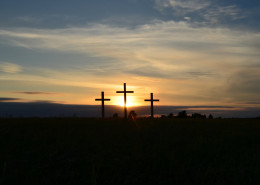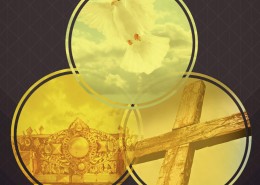Some people believe that after God created the world he simply left it to its own devices and now sits back and watches how things play out. Others believe that God has determined everything so rigidly that it doesn’t matter what we do in life. Neither of these beliefs is true, and God makes that clear in his Word. God tells us much about his providence, that is, his work in sustaining creation, enabling it to function, and directing its affairs. As we will see, God shows his unimaginable power and personalized care each and every day throughout the world to all creatures, especially to mankind.
Foreknowledge, Power, and Purpose
“With the Lord a day is like a thousand years, and a thousand years are like a day.”
2 Peter 3:8
There are two ways to understand God’s providence. In the wider sense, God’s providence is seen in his foreknowledge of all events as they occur in time. God is eternal, which means he is outside the realm of time (Genesis 21:33; 2 Peter 3:8; Revelation 1:8, 22:13) and is not limited by past, present, and future as we are. This means in his divine power he knows everything that is going to take place from before the creation of the world to the end. God’s providence in the wider sense is also seen in his divine decrees and plan. All things happen according to God’s design (Ephesians 1:11). All things that God declares must take place do take place (Isaiah 14:27). The events that we see take place in time are the events God has decreed from eternity.
Does that mean God has planned all of the evil things people do in time? No, God does not approve of the evil things that are done in the world (Psalm 92:15). In fact, he sometimes stops the evil we are about to commit (e.g., Genesis 19:11, 20:6; Numbers 22:12). He is very serious about his opposition to sin and evil (Romans 6:23; 2 Thessalonians 1:6-10). Each person is responsible for the evil things he or she does (Ezekiel 18:30). However, God does allow sin and evil to happen. Yet, in his providence he is able to govern everything so it works out for our good (Romans 8:28). God is able to take the evil things people do and make beautiful things happen out of them for the glory of his name and his gospel (2 Corinthians 4:15; Ephesians 3:20-21). For one example in Scripture, see what happened to Joseph and what God was able to do through it (Genesis 37:12-36, 45:4-11, 50:20). That is God’s grace and his love for people shown in his providence.
Preservation and Governance
Providence in the narrow sense is seen in God’s preservation and governance of creation. God enables each thing in this universe to function according to the nature he gave it at creation. Fire is hot. Ice is cold. Birds fly. Fish swim. Animals have instincts. Seeds germinate and grow. The stars give off light. All of creation operates as it should and is given life or action by God (Acts 17:28). God even continually provides sustenance for living things, such as food for animals or sunlight for plants. As the Psalmist declares, “All creatures look to you to give them their food at the proper time.” (Psalm 104:27; see also Psalm 136:25, 145:15-16, 147:9). In his providence, God provides for and preserves his beloved creation.
“The eyes of all look to you, and you give them their food at the proper time. You open your hand and satisfy the desires of every living thing.”
Psalm 145:15-16
God also governs the world. All powers and all authorities have been determined and set up by God (Job 12:23; Romans 13:1-7). He raises up kings and rulers, and he brings them down (Daniel 2:21). He directs the paths of all people (Jeremiah 10:23). He does so all in an effort to care for his church. “We know that in all things God works for the good of those who love him, who have been called according to his purpose” (Romans 8:28). God has directed and is directing the affairs of the entire world for the good of his people (see Election).
Personalized Care
While all of creation is under the providence of God (Job 12:13-25; 1 Corinthians 10:26), God is still powerful and loving enough to focus on each individual creature. As Jesus said, “Are not two sparrows sold for a penny? Yet not one of them will fall to the ground outside your Father’s care” (Matthew 10:29). God cares for even the seemingly insignificant sparrow. More than any other creature, though, God cares for us: “Even the very hairs of your head are all numbered. So don’t be afraid; you are worth more than many sparrows” (Matthew 10:30-31). We can take comfort in the fact that God cares so much for each human that not one hair falls to the ground without God’s command.
Care by Natural Means
All preservation can be traced directly back to God (Acts 17:28; Colossians 1:17; Psalm 104:29-30). However, God still uses others in his creation to give support to one another. We can help provide food and water for each other. Doctors and scientists provide medicine and technology that help keep people alive. God has told us we are to work for a living (2 Thessalonians 3:10) to support not only ourselves but also others. While he has the power to provide for us miraculously, God does not want us to neglect the things he provides for us by natural means (Isaiah 28:23-29). It is important to remember that God has not promised to provide a miracle every time we ask for one. Instead, we faithfully trust in God’s care just as Jesus did when the devil tried to tempt him into demanding a miracle from God. Jesus told the devil, “Do not put the Lord your God to the test” (Matthew 4:7). We are not to test God because he has provided the natural means to care for us and has promised to preserve us by them (Matthew 6:25-34).
God’s Plan and Our Choices
All of this means that Scripture teaches us an interesting paradox: things must happen as they do, but things could happen differently. God has decreed and designed all things. Yet we can determine what things happen in our lives. How could both of these possibly be true? It depends on whose perspective you’re looking at it from. From the perspective of God and his providence, things must happen as he has determined. Most of the time he does this by the natural means already mentioned. Sometimes he does this through miracles. Many times in the past God even told his people what would take place in the future through prophecies (1 Peter 1:10-12). He is not bound by his creation and can do what he sees fit to achieve the things he has planned out for the sake of his people (Romans 8:28,38-39).
“By [the Son] all things were created: things in heaven and on earth, visible and invisible, whether thrones or powers or rulers or authorities; all things were created by him and for him.”
Colossians 1:16
From the perspective of human beings, the choices we make do change our paths in life. We are not pawns that are only able to do the bidding of fate. We must not live as if we have no say in what happens. Humans can lengthen their lives by making healthy choices, or they can shorten their lives by making unhealthy ones. They can lengthen other people’s lives by giving them food, medicine, or doctoral care, or they can shorten other people’s lives through accidents or murder. People can choose their careers, their spouses, their interests, etc. God has given us our human reason to help us live wisely on this earth. God even promises that the prayer of a Christian can change things (James 5:16), as he weaves that prayer into his divine plan (see Prayer). From our human perspective, our actions and choices in life do indeed matter.
It is a great comfort knowing that God has planned everything from eternity and works to care for his people. It is also humbling to think that God is weaving our prayers and actions into his plan. As we can see from what God tells us of his foreknowledge, his governance of the world, and his personalized care for his creatures, God has loved his creation from before the beginning of time and continues to love his creation in time. That is God’s loving providence.





